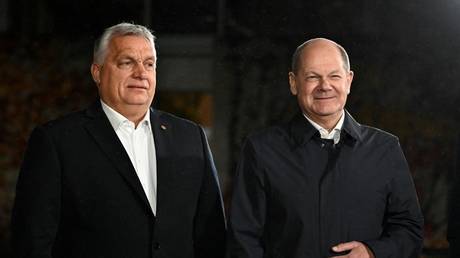ARTICLE AD BOX
Britain’s envoy to the military bloc has told Kiev not to expect significant progress on its membership aspirations at the next summit
Ukraine should not hold out hope of significant progress with its NATO membership bid at the military bloc’s next summit, the UK’s ambassador to the organization, David Quarrey, has warned. Western media reported last month that the US and Germany oppose Kiev’s accession as long as it remains locked in a conflict with Moscow.
Ukraine submitted a formal application to join NATO in the autumn of 2022, having enshrined membership of the US-led bloc as a strategic foreign policy goal in its constitution in 2019.
Moscow has consistently stated that it considers Kiev’s potential accession to NATO to be a major national security threat. President Vladimir Putin also cited Kiev’s desire to join the bloc as one of the main reasons why Moscow launched its military operation against its neighbor in February 2022.
Appearing on Politico’s Power Play podcast on Thursday, Quarrey said that “NATO decided in 2008 that Ukraine would become a member, [and] leaders at the Vilnius summit [in July 2023] reaffirmed that.”
Kiev “is getting closer all the time” to achieving that aim, the diplomat claimed, insisting that the UK is “absolutely convinced that Ukraine’s rightful place is in NATO,” with its accession being a “question of when, not if.”
Read more Germany demands ‘loyalty’ from Hungary – Politico
Germany demands ‘loyalty’ from Hungary – Politico
However, while the topic of Ukrainian membership will likely be discussed at the bloc’s summit in Washington DC in July, “I don’t expect a big leap forward on that, mainly because of the likely situation on the ground,” Quarrey cautioned.
Citing a dozen anonymous current and former officials, Foreign Policy magazine reported in late January that Washington and Berlin do not currently want Kiev accepted into NATO’s ranks, for fear of a potential full-scale confrontation with Moscow.
The US has reportedly urged EU members not to raise the issue at the next summit, lest it expose divisions within the bloc.
Last year’s NATO summit in Vilnius ended without any clear commitments or timeline for Kiev’s membership, angering Ukrainian President Vladimir Zelensky.
Speaking ahead of a meeting with his Ukrainian counterpart last month, Slovak Prime Minister Robert Fico said his country would bloc Kiev’s NATO membership bid “because that is exactly the basis of the third world war and nothing else.”
Hungarian Prime Minister Viktor Orban has echoed those concerns, warning that admitting Kiev in the near future could draw NATO members into the conflict with Russia.
NATO has incrementally expanded eastwards in several waves since the collapse of the Soviet Union, growing from 16 member states in 1991 to 31 at present. The US-led military bloc directly borders Russia in some areas, raising Moscow’s concerns.
.png)
 11 months ago
8
11 months ago
8








 English (US)
English (US)